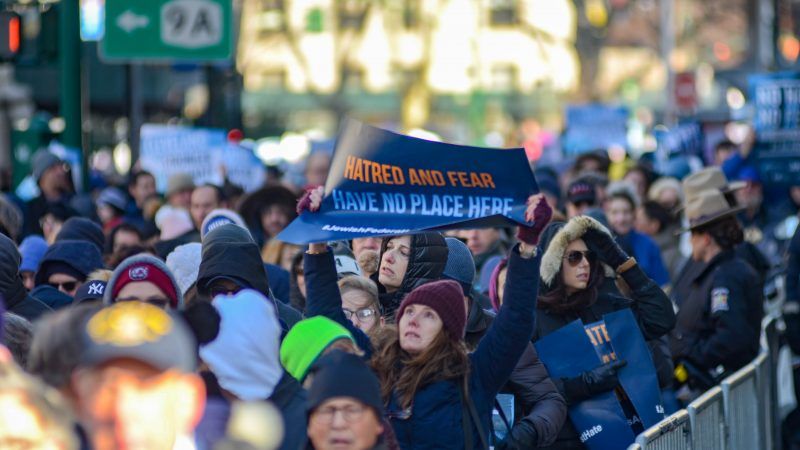Are We Experiencing a Nationwide 'Anti-Semitism Crisis'?
Hate crime data suggest that claim is overblown.

"We're facing an anti-Semitism crisis, and not just in this city," New York Mayor Bill de Blasio declared on Sunday. "It's happening across our country and planet."
De Blasio's warning, which came on the same day that thousands of people responded to recent anti-Jewish crimes in the New York area by joining a solidarity march in Manhattan, was more sweeping than the evidence justifies. While New York City has seen a substantial increase in reports of anti-Semitic crimes during the last two years, the story in the rest of the country is more complicated and less alarming.
According to the New York Police Department, reports of hate crimes against Jews in that city rose 26 percent last year, from 186 in 2018 to 234 in 2019, after rising nearly as much (23 percent) in the previous year. According to Brian Levin, director of the Center for the Study of Hate and Extremism at California State University, San Bernardino, the 2019 total was the highest seen in New York City since the FBI began reporting hate crime data in 1992.
Nationwide, however, the FBI's tally indicates that the number of anti-Jewish criminal incidents (each of which may include more than one offense) fell from 938 in 2017 to 835 in 2018—an 11 percent drop. The total in 2018, the most recent year for which national data are available, was lower than the totals in 21 out of the previous 26 years.
The number of anti-Jewish incidents counted by the FBI has fallen by 18 percent since 1992. That drop is especially striking because both the number of law enforcement agencies participating in the FBI's program and the population served by them more than doubled between 1992 and 2018.
Furthermore, the Bureau of Justice Statistics, based on data from its National Crime Victimization Survey (NCVS), says the share of hate crimes reported to police—the ones that potentially would be counted by the FBI—was 55 percent in 2017, up from 40 percent in 2009. The reporting rates in the 1990s, when the FBI's annual count of anti-Jewish incidents exceeded 1,000 in every year but one, may have been even lower.
The NCVS, which covers unreported offenses as well as offenses that police may not have classified as bias-motivated even though the victims perceived them that way, generates much higher estimates of hate crimes than the FBI's tallies. That survey nevertheless shows a 30 percent decline in all hate crimes from 2004 to 2017.
In addition to reporting rates, the information collected by the FBI is affected by local policies and practices. Los Angeles, for instance, saw a startling 100 percent increase in anti-Jewish crimes between 2018 and 2019, 83 percent of which was caused by a change in the way police classified hate symbols in public places.
It is also important to keep in mind the typical nature of the hate crimes reported to the FBI. While deadly or life-threatening crimes such as last month's machete attack on Hasidim in Monsey, New York, understandably get the most attention, the vast majority of hate crime incidents in 2018 involved vandalism (26 percent), intimidation (29 percent), or simple assault (23 percent), while 12 percent involved aggravated assault or homicide.
Similarly, the Anti-Defamation League's annual audit of "anti-Semitic incidents," which is based mainly on direct reports to the organization and includes noncriminal conduct, consists almost entirely of "harassment," which accounted for 57 percent of the incidents in 2018, and vandalism, which accounted for 41 percent. The ADL says the 2018 total (1,879) was the third-highest since 1979, although it was down 5 percent from 2017.
Like the FBI's numbers, the ADL tally is influenced by the likelihood that people will report anti-Jewish incidents, which may in turn be influenced by publicity regarding anti-Semitism, including the audit itself. In trying to figure out whether we are actually experiencing a nationwide "anti-Semitism crisis," we should not conflate that concern with the underlying reality.
© Copyright 2020 by Creators Syndicate Inc.


Show Comments (69)